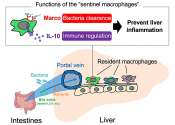Ulcerative colitis (Colitis ulcerosa, UC) is a form of inflammatory bowel disease (IBD). Ulcerative colitis is a form of colitis, a disease of the intestine, specifically the large intestine or colon, that includes characteristic ulcers, or open sores, in the colon. The main symptom of active disease is usually constant diarrhea mixed with blood, of gradual onset. Ulcerative colitis is, however, believed to have a systemic etiology that leads to many symptoms outside the intestine. Because of the name, IBD is often confused with irritable bowel syndrome ("IBS"), a troublesome, but much less serious, condition. Ulcerative colitis has similarities to Crohn's disease, another form of IBD. Ulcerative colitis is an intermittent disease, with periods of exacerbated symptoms, and periods that are relatively symptom-free. Although the symptoms of ulcerative colitis can sometimes diminish on their own, the disease usually requires treatment to go into remission.
Ulcerative colitis occurs in 35–100 people for every 100,000 in the United States, or less than 0.1% of the population. The disease tends to be more common in northern areas. Although ulcerative colitis has no known cause, there is a presumed genetic component to susceptibility. The disease may be triggered in a susceptible person by environmental factors. Although dietary modification may reduce the discomfort of a person with the disease, ulcerative colitis is not thought to be caused by dietary factors. Although ulcerative colitis is treated as though it were an autoimmune disease, there is no consensus that it is such. Treatment is with anti-inflammatory drugs, immunosuppression, and biological therapy targeting specific components of the immune response. Colectomy (partial or total removal of the large bowel through surgery) is occasionally necessary, and is considered to be a cure for the disease.









